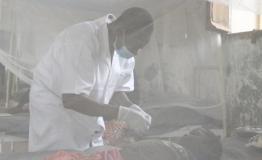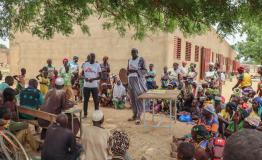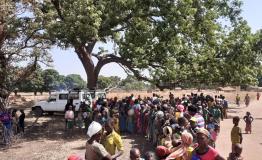

Measles
Measles is one of the leading causes of death among young children.
It is a highly contagious viral disease. A safe and effective vaccine has existed since the 1960s but outbreaks still occur due to ineffective or insufficient immunisation programmes.
While global measles deaths have decreased by 73 per cent worldwide in recent years – from 536,000 in 2000 to 142,000 in 2018 (according to the World Health Organizsation) – measles is still common in many developing countries, particularly in parts of Africa and Asia.
Severe measles is more likely among malnourished children under five. Those with insufficient vitamin A, or whose immune systems have been weakened by HIV/AIDS or other diseases, are especially likely to contract the virus.
About Measles
Measles is caused by the highly contagious measles virus. It is so contagious that 90 per cent of people without immunity who share living spaces with an infected person will catch it. Measles is transmitted via droplets from the nose, mouth or throat of infected people, by coughing, sneezing and breathing.
Symptoms appear between 10 and 14 days after exposure to the virus and include a runny nose, cough, eye infection, rash and high fever.
Clinical diagnosis of measles requires a history of fever of at least three days, with at least one of the three ‘Cs' (cough, catarrh, conjunctivitis) present.
Clusters of tiny white spots on the inside of the mouth, known as Koplik spots, are also a sign of measles. These usually occur two days before the outbreak of the measles rash itself.
There is no specific treatment for measles – patients are isolated and treated for a lack of vitamin A, eye-related complications, stomatitis (mouth ulcers) dehydration through diarrhoea, protein deficiencies and respiratory tract infections.
In high-income countries, most people infected with measles recover within two to three weeks and mortality rates are low. In developing countries;, however, the mortality rate can be up to 10 per cent, rising to 20 per cent in outbreaks with limited access to care.
Death is mostly due to severe respiratory infections, such as pneumonia; diarrhoea and stomatitis that can lead to malnutrition; and, more rarely, neurological complications such as encephalitis (inflammation of the brain).
A safe and cost-effective vaccine against measles exists, and large-scale vaccination campaigns have significantly decreased the number of cases and deaths.
The difficulty lies in the fact that at least 93 to 95 per cent of people need to be immune to prevent new outbreaks.
Coverage remains low in countries with weak health structures, or among people with limited access to health services and large outbreaks still occur.
In 2018, MSF vaccinated 1,479,800 people against measles in response to outbreaks.

![Yayai Logain with her children in MSF’s clinic in Pibor town. Two of Yayai’s children have measles.[ ©MSF/Andreea Campeanu ] Yayai Logain with her children in MSF’s clinic in Pibor town. Two of Yayai’s children have measles.](/sites/default/files/styles/card_half/public/msfimages/news/msf338884_medium.jpg?itok=BVfETKxt)
South Sudan: Urgent vaccination campaign needed to stop spread of measles in Pibor
![A woman carries tree branches to construct a new house in Pibor town [ © MSF/Tetiana Gaviuk] A woman carries tree branches to construct a new house in Pibor town](/sites/default/files/styles/card_half/public/msf337915_medium.jpg?itok=b6dUK8Da)
South Sudan: Severe flooding worsens in many areas, raising health risks

Burkina Faso: "It wasn't just COVID-19 we had to respond to"

Nearly two years on, measles epidemic in Chad is not under control
![Families register for the measles vaccination campaign in the village of Botulu, Boso Manzi health zone, Mongala province, DRC [MSF/Caroline Thirion] Families register for the measles vaccination campaign in Botulu, Boso Manzi health zone](/sites/default/files/styles/card_half/public/msfimages/news/msf316396_medium.jpg?itok=bL89yjmO)